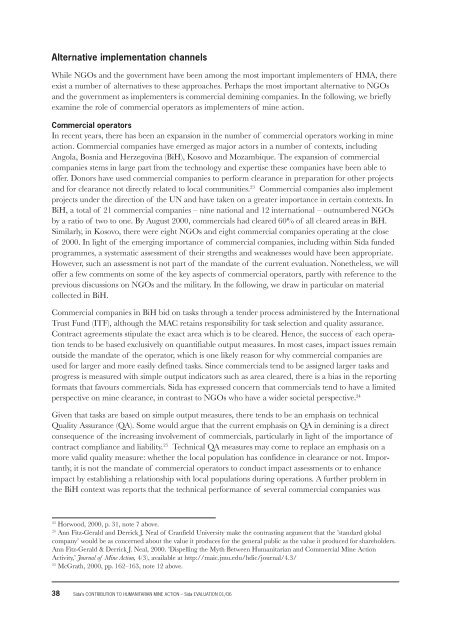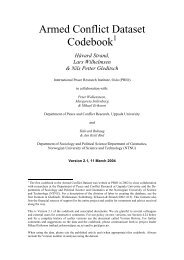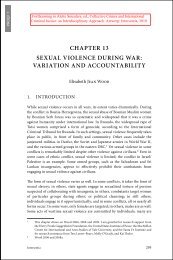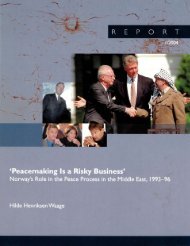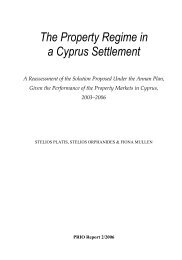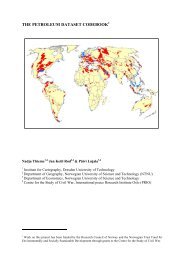Sida's Contributions to Humanitarian Mine Action
Sida's Contributions to Humanitarian Mine Action
Sida's Contributions to Humanitarian Mine Action
Create successful ePaper yourself
Turn your PDF publications into a flip-book with our unique Google optimized e-Paper software.
Alternative implementation channelsWhile NGOs and the government have been among the most important implementers of HMA, thereexist a number of alternatives <strong>to</strong> these approaches. Perhaps the most important alternative <strong>to</strong> NGOsand the government as implementers is commercial demining companies. In the following, we brieflyexamine the role of commercial opera<strong>to</strong>rs as implementers of mine action.Commercial opera<strong>to</strong>rsIn recent years, there has been an expansion in the number of commercial opera<strong>to</strong>rs working in mineaction. Commercial companies have emerged as major ac<strong>to</strong>rs in a number of contexts, includingAngola, Bosnia and Herzegovina (BiH), Kosovo and Mozambique. The expansion of commercialcompanies stems in large part from the technology and expertise these companies have been able <strong>to</strong>offer. Donors have used commercial companies <strong>to</strong> perform clearance in preparation for other projectsand for clearance not directly related <strong>to</strong> local communities. 23 Commercial companies also implementprojects under the direction of the UN and have taken on a greater importance in certain contexts. InBiH, a <strong>to</strong>tal of 21 commercial companies – nine national and 12 international – outnumbered NGOsby a ratio of two <strong>to</strong> one. By August 2000, commercials had cleared 60% of all cleared areas in BiH.Similarly, in Kosovo, there were eight NGOs and eight commercial companies operating at the closeof 2000. In light of the emerging importance of commercial companies, including within Sida fundedprogrammes, a systematic assessment of their strengths and weaknesses would have been appropriate.However, such an assessment is not part of the mandate of the current evaluation. Nonetheless, we willoffer a few comments on some of the key aspects of commercial opera<strong>to</strong>rs, partly with reference <strong>to</strong> theprevious discussions on NGOs and the military. In the following, we draw in particular on materialcollected in BiH.Commercial companies in BiH bid on tasks through a tender process administered by the InternationalTrust Fund (ITF), although the MAC retains responsibility for task selection and quality assurance.Contract agreements stipulate the exact area which is <strong>to</strong> be cleared. Hence, the success of each operationtends <strong>to</strong> be based exclusively on quantifiable output measures. In most cases, impact issues remainoutside the mandate of the opera<strong>to</strong>r, which is one likely reason for why commercial companies areused for larger and more easily defined tasks. Since commercials tend <strong>to</strong> be assigned larger tasks andprogress is measured with simple output indica<strong>to</strong>rs such as area cleared, there is a bias in the reportingformats that favours commercials. Sida has expressed concern that commercials tend <strong>to</strong> have a limitedperspective on mine clearance, in contrast <strong>to</strong> NGOs who have a wider societal perspective. 24Given that tasks are based on simple output measures, there tends <strong>to</strong> be an emphasis on technicalQuality Assurance (QA). Some would argue that the current emphasis on QA in demining is a directconsequence of the increasing involvement of commercials, particularly in light of the importance ofcontract compliance and liability. 25 Technical QA measures may come <strong>to</strong> replace an emphasis on amore valid quality measure: whether the local population has confidence in clearance or not. Importantly,it is not the mandate of commercial opera<strong>to</strong>rs <strong>to</strong> conduct impact assessments or <strong>to</strong> enhanceimpact by establishing a relationship with local populations during operations. A further problem inthe BiH context was reports that the technical performance of several commercial companies was23Horwood, 2000, p. 31, note 7 above.24Ann Fitz-Gerald and Derrick J. Neal of Cranfield University make the contrasting argument that the ’standard globalcompany’ would be as concerned about the value it produces for the general public as the value it produced for shareholders.Ann Fitz-Gerald & Derrick J. Neal, 2000. ’Dispelling the Myth Between <strong>Humanitarian</strong> and Commercial <strong>Mine</strong> <strong>Action</strong>Activity,’ Journal of <strong>Mine</strong> <strong>Action</strong>, 4(3), available at http://maic.jmu.edu/hdic/journal/4.3/25McGrath, 2000, pp. 162–163, note 12 above.38 Sida’s CONTRIBUTION TO HUMANITARIAN MINE ACTION – Sida EVALUATION 01/06


